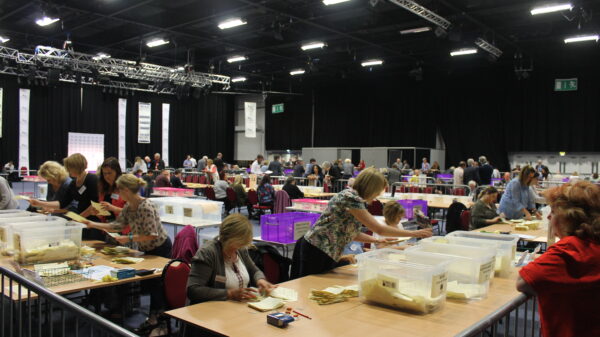Staff writer Ewan White recounts his experience of campaigning for the Liberal Democrats in the Mid Bedfordshire by-election.
Perhaps the first question asked during Freshers’ Week was:
“Where are you from?”
I am from Shefford. A town of around 7,000 in Bedfordshire; the least popular of all 47 counties according to a 2018 YouGov survey.
Despite Freshers’ Week making me all too aware of the obscurity of my hometown, it had slowly descended into unprecedented media attention following the news that Nadine Dorries would resign as an MP for the Mid Bedfordshire constituency, to which Shefford belonged. However, having announced she would resign with “immediate effect” on 9 June, she proceeded to remain as MP for 11 weeks.
Nevertheless, in those sunny June days, unaware of what Nadine Dorries was planning to do, the parties began plotting their attempt to win the eventual by-election.
Ready, Set, Go! Wait!
I joined the Liberal Democrats (Lib Dems) in April 2022; however, my party activity consisted of little more than receiving emails and quarterly updates. But I was keen to go out campaigning. I was angry after having had an MP whose main residence was not in the constituency, but in Gloucestershire. Even worse, her constituency office was now a dance studio. I was aware that knocking on people’s doors would not change the world. Nevertheless, campaigning reinvigorated that initial thrill of getting involved in organised politics that I had first felt when I joined the Lib Dems.
In this spirit, I volunteered to go door-knocking for the first time on 17 June. Having already been canvassed by the Labour Party that day, my campaign helper arrived. In his mid-20s, he wore a suit decked out in Lib Dem colours. His mother had driven him down from Worcestershire to campaign. It was an interesting introduction to the world of political campaigning, to say the least.
Walking around for 3 hours in the June sun knocking on doors to be met with the reply of “No, thank you” is not exactly fun. But it is that thought of ‘I’m involved’ that keeps you going. Such a thought was only reinforced when I voted for Emma Holland Lindsay to become the Lib Dem candidate for Mid Bedfordshire, which she did.
However, my political campaigning was reduced to only a sporadic leaflet drop here and there, as Nadine Dorries wavered about when she would leave her post. Despite, or perhaps because of her actions, Sir Keir Starmer visited the town in late July. A potential future Prime Minister visiting Shefford. Incredible!
Upon Dorries’ resignation in late August, the by-election was pencilled in for 19 October. Now the real campaign began.
The Campaign
The first thing to note is the contrast between being a party member during election time and outside of election time. Outside of election time, no one would know that you were a member of a political party. During election time, there is a sudden frenzy of activity, with frequent knocks on the door from party members delivering batches of leaflets to be distributed. There are phone calls from unknown numbers; which predictably turn out to be from the local party. It can be quite overwhelming.
As for the campaign itself, it saw little out of the ordinary. All parties’ candidates said they would be an active local MP in the constituency, and almost all attempted to highlight how they were local to the area. This was of little surprise given that Nadine Dorries’ absence from the constituency had been a constant source of frustration for many constituents. The fight over being a ‘local’ candidate provoked some conflict when the Lib Dems highlighted how the Labour candidate was a councillor in London. Despite Labour’s anger, it was true. The Labour candidate had only moved to Shefford after being selected as a candidate. However, he had grown up in Bedfordshire.
The campaign saw the parties employ the traditional method of delivering shedloads of campaign literature. Yet the literature, before I went to university in mid-September, was almost entirely from the Lib Dems and Labour.
On these red and yellow leaflets, there was, in truth, little difference in the promises being made. Both candidates promised to tackle the cost of living. Both candidates promised to improve local NHS services. Both candidates highlighted issues with the local planning system.
This was the typical in by-election campaigning. Making promises on local issues that, in reality, as an MP, they would have little power to change.
Nevertheless, the differences in the campaign literature were revealing. The Liberal Democrats campaigned more on the environment and the state of the local rivers, positioning themselves more towards the rural vote.
Both parties sought to portray themselves as the best challenger to the Conservatives (Tories). But, as a Lib Dem, I was dismayed with our strategy in doing this. Whereas Labour could use polling data to demonstrate themselves as neck and neck with the Tories, the Lib Dems relied on two things. First, that some political pundits and betting outlets had put the Lib Dems as the key challenger to the Conservatives. After Labour overtook the Lib Dems as the bookies’ favourite in mid-September, the Lib Dems relied more on stressing, as they had done throughout the campaign, that Labour could not win in a rural area. Yet, living in Shefford, I did not feel that I lived in a rural area. The message did not resonate with me. Even worse, how could we compete against those poll numbers?
Moreover, Labour ran local ‘meet the candidate’ events, (which were keenly advertised in campaign literature), in the major towns in the constituency. This was combined with YouTube advertisements to provide a campaign that went beyond sheer literature dumping, although there was plenty of this. Despite the Lib Dems providing local constituency surgeries, I thought that we were simply not keeping pace with Labour in the campaign.
Whilst I was still in Shefford, the other parties remained inert. The Conservatives would later kick in with a campaign over protecting the Green Belt. Reform UK would campaign as the ‘low-tax’ party. But none of this was particularly surprising.
The standing of ‘Prince Ankit Love, Emperor of India,’ as a candidate, on the other hand, was highly surprising, and intriguing.
By the time I was delivering my final round of leaflets, the morning before moving into my university halls, in mid-September, much of my initial zeal had been sapped. I felt as though Labour would win or that the Conservatives would come through the middle. The Lib Dems had gone from a 60% chance of winning to a 30% chance. I questioned what we could have done differently. Prominent in my mind was the thought that we were the only party who fully believed in Proportional Representation (PR); a voting system that could help prevent safe seats like Mid Bedfordshire from forming. Safe seats where MPs, such as Nadine Dorries, could take their constituents for granted. However, the British public had overwhelmingly rejected even moderate electoral reform in the 2011 referendum on the subject, with voter turnout only amounting to 42%. Frankly put, voters cared little for the issue.
The Vote
On 19 October, I went back home to vote. I wanted to vote in person, rather than submit a postal vote. I got the same political kick from voting in person as I got from joining a political party.
The result was announced in the Central Bedfordshire council offices on the edge of Shefford, and it was extraordinary. The biggest Tory majority Labour had overturned in a by-election since 1945. No other party had held the constituency apart from the Conservatives since 1931. Even if I was disappointed to see the Lib Dems come in 3rd place with 23% of the vote, to have such an incredible result in my constituency was surreal. I had thought my hometown would remain anonymous for my entire lifetime!
A Surreal Experience
The by-election was a mixture of the strange and the standard. You might see something out of the ordinary here and there, but in general, it was the standard by-election campaign. Tons of campaign literature focused on local issues. But punctuating it all was a sense of the surreal. All this drama over Nadine Dorries; all this media attention. This historic by-election, in my little bit of the world! Quite surreal.













